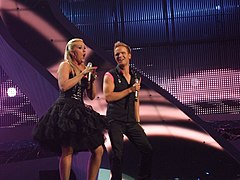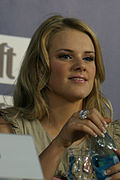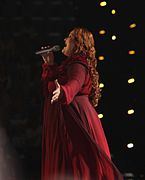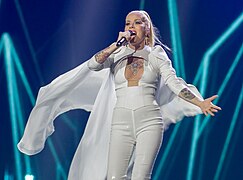Iceland at the Eurovision Song Contest
This article looks at Iceland's history as a participant in the Eurovision Song Contest .
Regularity of participation and successes in competition
Iceland was only able to take part from 1986 onwards, as remote data transmission to the remote island was not technically feasible before. The 1986 debut was not very successful. The band ICY got a rather bad ranking with place 16 out of 20. But also in 1987 and 1988 only 16th place was reached, with which the country reached the same place three times in a row. In 1989 the worst placement in the competition followed. Daníel Ágúst ended up in last place and did not achieve a single point. The duo Stjórnin was correspondingly more successful in 1990. They reached 4th place and with 124 points Iceland's best result to date. After an average 15th place in 1991, the second place in the top ten followed in 1992. The band Heart 2 Heart finally reached number 7. From 1993 to 1997 Iceland had many average placements. In 1994 the Icelandic contribution landed in 12th place, in 1993 and 1996 in 13th place, in 1995 in 15th place and in 1997 finally in 20th place. Because of these rather weak placements, the country had to take out the competition for the first time in 1998. It was not until 1999 that the country was allowed to participate again.
In 1999 the return was very successful. Selma took almost Iceland's first victory with second place and with 146 points Iceland's best result in the competition so far. In 2000, however, 12th place was again only an average place. In 2001 Iceland finished last for the second time with a shared last place. As a result, the country had to suspend again in 2002. It was not until 2003 that the country was allowed to participate again and in the same year achieved another place in the top ten with place 8. In 2004, however, only a moderate result was achieved with 19th place. In 2005 Selma was sent again, who took second place in 1999. However, their second participation was not very successful. Selma did not reach the final in the semifinals with place 16 and was the first Icelandic interpreter who could not qualify for the final. However, the Icelandic interpreters in 2006 and 2007 also failed to reach the finals. Thus, Iceland was not represented in the final three times in a row for the first time. It wasn't until 2008 that Iceland got better in the competition.
In 2008 the duo Euroband then managed to qualify for the final, which was the first Icelandic entry in the final in four years. With 14th place, however, only an average result was achieved. Iceland's most successful contribution to date followed in 2009. Yohanna was able to win the semi-finals and was thus qualified for the final. There she took second place in Iceland, the best place in ten years. With 218 points, however, she got more points than Selma in 1999, with which she got Iceland's best result to date. Your score was also Iceland's highest score in the competition until then. In 2010, however, this success could not be repeated. Hera Björk reached 3rd place in the semifinals and thus qualified for the final, but was only able to reach 19th place and thus achieved another average placement for the country. In 2011 and 2012 the Icelandic interpreters got rather mediocre results with 20th place each. In 2013, Eythor Ingi again only achieved an average result with 17th place. In 2014 Pollapönk achieved the best result since 2009 with 15th place, but overall the place was only an average placement. In 2015, María Ólafs then failed in the semi-finals, making Iceland not represented in the final for the first time in eight years. With the third from last place, she also clearly failed in qualifying. Greta Salóme 2016, who already participated with Jónsi in 2012 and reached 20th place, was eliminated in the semifinals. Svala also failed to qualify for the final in 2017 and clearly failed to qualify with 15th place. The previous low point for Iceland at the ESC followed in 2018. Ari Ólafsson finished last in the semi-finals, making Iceland miss the final four times in a row for the first time. In addition, he received 0 points from the televoting and only 14 points from the jury. He also finished last overall, finishing 43rd, Iceland's worst placement in the competition. In 2019, however, the island made it to the finals again after four years, after the band Hatari took third place in the semifinals. In the finals, Iceland achieved 10th place, the best ranking in ten years. In addition, the country achieved a new high of 232 points in 2019.
In total, only eight of the 32 entries ended up in the left half of the table. In addition, the country has missed the final seven times and was last three times. Nevertheless, the country has already landed in second place twice so far. Overall, Iceland is one of the less successful countries in the competition. In addition, Iceland is the only Northern European country that has never won, while Sweden, Norway and Denmark have already won more than three wins and Finland has won once so far.
List of posts
Color legend: - 1st place. - 2nd place. - 3rd place. - Equal points with last place. - Eliminated in the semifinals / in the qualification / in the Eastern European preliminary decision. - no participation / not qualified. - Cancellation of the Eurovision Song Contest.
| year | Interpreter | Song Music (M) and Text (T) |
language | translation | final | Semi-final / qualification |
National preliminary decision | ||
|---|---|---|---|---|---|---|---|---|---|
| space | Points | space | Points | ||||||
| 1986 | ICY |
Gleðibankinn M / T: Magnús Eiríksson |
Icelandic | Freudenbank | 16/20 | 19th | Direct participation | Söngvakeppni Sjónvarpsins 1986 | |
| 1987 | Halla Margrét |
Hægt og hljótt M / T: Valgeir Guðjónsson |
Icelandic | Slowly and quietly | 16/22 | 28 | Söngvakeppni Sjónvarpsins 1987 | ||
| 1988 | Beathoven |
Þú og þeir (Sókrates) M / T: Sverrir Stormsker |
Icelandic | You and her (Socrates) | 16/21 | 20th | Söngvakeppni Sjónvarpsins 1988 | ||
| 1989 | Daníel Ágúst |
Það sem enginn sér M / T: Valgeir Guðjónsson |
Icelandic | What nobody sees | 22/22 | 0 | Söngvakeppni Sjónvarpsins 1989 | ||
| 1990 | Stjórnin |
Eitt lay enn M: Hörður G. Ólafsson; T: Aðalsteinn Ásberg Sigurðsson |
Icelandic | One more song | 4/22 | 124 | Söngvakeppni Sjónvarpsins 1990 | ||
| 1991 | Stefán & Eyfi |
Draumur to Nínu M / T: Eyjólfur Kristjánsson |
Icelandic | The dream about Nina | 15/22 | 26th | Söngvakeppni Sjónvarpsins 1991 | ||
| 1992 | Heart 2 Heart |
Nei eða já M: Friðrik Karlsson, Grétar Örvarsson; T: Stefán Hilmarsson |
Icelandic | No or yes | 7/23 | 80 | Söngvakeppni Sjónvarpsins 1992 | ||
| 1993 | Inga |
Þá veistu svarið M: Jon Kjell Seljeseth; T: Friðrik Sturluson |
Icelandic | Then you will know the answer | 13/25 | 42 | Söngvakeppni Sjónvarpsins 1993 | ||
| 1994 | Sigga |
Nætur M: Friðrik Karlsson; T: Stefán Hilmarsson |
Icelandic | nights | 12/25 | 49 | Qualified directly for the final | Söngvakeppni Sjónvarpsins 1994 | |
| 1995 | Bo Halldórsson |
Núna M: Bo Halldórsson, Ed Welch; T: Jón Örn Marinósson |
Icelandic | Now | 15/23 | 31 | internal selection | ||
| 1996 | Anna Mjöll |
Sjúbídú M / T: Anna Mjöll Ólafsdóttir, Ólafur Gaukur Þórhallsson |
Icelandic | Schubidu | 13/23 | 51 | 10/29 | 49 | internal selection |
| 1997 | Paul Oscar |
Minn hinsti dans M: Paul Oscar, Trausti Haraldsson; T: Paul Oscar |
Icelandic | My last dance | 20/25 | 18th | Qualified directly for the final | internal selection | |
| 1998 | Not qualified | ||||||||
| 1999 | Selma |
All Out of Luck M: Þorvaldur Bjarni Þorvaldsson, Sveinbjörn I. Baldvinsson, Selma Björnsdóttir; T: Þorvaldur Bjarni Þorvaldsson |
English | Forsaken by luck | 2/23 | 146 | Qualified directly for the final | internal selection | |
| 2000 | August & Telma |
Tell me! M: Örlygur Smári; T: Örlygur Smári, Sigurður Örn Jónsson |
English | Tell me! | 12/24 | 45 | Söngvakeppni Sjónvarpsins 2000 | ||
| 2001 | Two tricky |
Angel M: Einar Bárðarson, Magnús Þór Sigmundsson; T: Einar Bárðarson |
English | Angel | 22/23 | 3 | Söngvakeppni Sjónvarpsins 2001 | ||
| 2002 | Not qualified | ||||||||
| 2003 | Birgitta |
Open Your Heart M: Birgitta Haukdal; T: Hallgrímur Óskarsson |
English | Open your heart | 8/26 | 81 | Qualified directly for the final | Söngvakeppni Sjónvarpsins 2003 | |
| 2004 | Jónsi |
Heaven M: Sveinn Rúnar Sigurðsson; T: Magnús Þór Sigmundsson |
English | sky | 19/24 | 16 | internal selection | ||
| 2005 | Selma |
If I Had Your Love M: Þ. Þorvaldsson, Vignir Vigfusson; T: Selma, Linda Thompson |
English | If you would love me | Eliminated | 16/25 | 52 | internal selection | |
| 2006 | Silvía Nótt |
Congratulations M: Þorvaldur Bjarni Þorvaldsson; T: Silvia Night |
English | Congratulations | Eliminated | 13/24 | 62 | Söngvakeppni Sjónvarpsins 2006 | |
| 2007 | Eiríkur Hauksson |
Valentine Lost M: Sveinn Rúnar Sigurðsson; T: Peter Fenner |
English | Lost Valentine's Day gift | Eliminated | 13/28 | 77 | Söngvakeppni Sjónvarpsins 2007 | |
| 2008 | Euroband |
This Is My Life M: Örlygur Smári; T: Paul Oscar, Peter Fenner |
English | That is my life | 14/25 | 64 | 8/19 | 68 | Söngvakeppni Sjónvarpsins 2008 |
| 2009 | Yohanna |
Is It True? M / T: Óskar Páll Sveinsson, Chris Neil, Tinatin |
English | Is it true? | 2/25 | 218 | 1/18 | 174 | Söngvakeppni Sjónvarpsins 2009 |
| 2010 | Hera Bjork |
Je ne sais quoi M / T: Örlygur Smári, Hera Björk |
English, French | I do not know what | 19/25 | 41 | 3/17 | 123 | Söngvakeppni Sjónvarpsins 2010 |
| 2011 | Sjonni's Friends |
Coming Home M: Sigurjón Brink; T: Þórunn Erna Clausen |
English | Return home | 20/25 | 61 | 4/19 | 100 | Söngvakeppni Sjónvarpsins 2011 |
| 2012 | Greta Salóme & Jónsi |
Never Forget M / T: Greta Salóme |
English | Never forget | 20/26 | 46 | 8/18 | 75 | Söngvakeppnin 2012 |
| 2013 | Eyþór Ingi |
Ég á Líf M / T: Örlygur Smári, Pétur Örn Gudmundsson |
Icelandic | I have a life | 17/26 | 47 | 6/17 | 72 | Söngvakeppnin 2013 |
| 2014 | Pollapönk |
No Prejudice M: Heiðar Örn Kristjánsson ; T: Heidar Orn Kristjansson , Haraldur Freyr Gislason , John Grant |
English | No prejudices | 15/26 | 58 | 8/16 | 61 | Söngvakeppnin 2014 |
| 2015 | María Ólafsdóttir |
Unbroken M: Ásgeir Orri Ásgeirsson, Pálmi Ragnar Ásgeirsson, Sæþór Kristjánsson; T: Ásgeir Orri Ásgeirsson, Pálmi Ragnar Ásgeirsson, Sæþór Kristjánsson, María Ólafsdóttir |
English | Unbroken | Eliminated | 15/17 | 14th | Söngvakeppnin 2015 | |
| 2016 | Greta Salome |
Hear Them Calling M / T: Greta Salóme Stefánsdóttir |
English | Hear them calling | Eliminated | 14/18 | 51 | Söngvakeppnin 2016 | |
| 2017 | Svala |
Paper M: Svala Björgvinsdóttir , Einar Egilsson, Lester Mendez, Lily Elise; T: Svala Björgvinsdóttir , Lily Elise |
English | paper | Eliminated | 15/18 | 60 | Söngvakeppnin 2017 | |
| 2018 | Ari Ólafsson |
Our Choice M / T: Þórunn Erna Clausen |
English | Our choice | Eliminated | 19/19 | 15th | Söngvakeppnin 2018 | |
| 2019 | Hatari |
Hatrið mun sigra M / T: Hatari |
Icelandic | Hatred will prevail | 10/26 | 232 | 3/17 | 221 | Söngvakeppnin 2019 |
|
|
Daði & Gagnamagnið |
Think About Things M / T: Daði Freyr |
English | Think about things |
Cancellation due to the COVID-19 pandemic by the EBU |
Söngvakeppnin 2020 | |||
National preliminary decisions
Up to and including 1994, all Icelandic entries were selected in a national preliminary decision, and in 1990 there were also two semi-finals. Often the selection was changed after the decision: in 1986 the contribution was originally only presented by Pálmi Gunnarsson, the Icy group was formed later. In 1994 the television broadcaster RUV was dissatisfied and on the one hand replaced the singer Sigrún Eva Ármannsdóttir with Sigríður Beinteinsdóttir (with whom she had sung two years earlier in the group Heart2Heart) and on the other hand the song Nætur was rearranged by Frank McNamara.
In the phase 1995 up to and including 1999, all contributions were selected internally, before a preliminary decision based on the old concept was introduced again by 2003, which, however, had to give way to the internal selection again in 2004 and 2005. In 2006 a new preliminary decision mode was introduced, which included three semi-finals with eight titles each. The concept achieved high ratings, so it was carried out again in 2007.
A new mode was introduced in 2008. At that time there were eleven quarter-finals with three songs each, one of which was directly voted on. A jury selected three entries from the other songs for a twelfth quarter-final. The twelve winners were divided into four semifinals. Of three songs, two each were voted into the final by telephone. In the final, too, it was only the audience who decided on the winner. In 2009 this complicated system was slimmed down. Since then there have been no more quarter-finals, only two semi-finals and a final. The decision about the finalists and the winner is still made by telephone voting.
languages
Iceland stayed true to its national language up to and including 1998. From 1986 to 1997, the Icelandic contributions were performed in the national language in accordance with the rules, even if an English version was recorded for all songs. After the fall of the language rule, the picture changed, since then, except for 2013 and 2019, all contributions have been sung completely in English (2010: French-language title line). In the years in which a national preliminary decision took place, all contributions had to be presented in Icelandic, so that Icelandic versions also exist in these years (2000, 2001, 2003, 2006, 2007 and since 2011). In 2013 Iceland participated for the first time with a contribution in the national language, without the rules requiring it. In 2019 Iceland sang in Icelandic for the second time without the rules dictating it.
Scoring
The following countries received the most points from or awarded the most points to Iceland (as of 2019):
|
|
|
|
||||||||||||||||||||||||||||||||||||||||||||||||||||||||||||||||||||||||||||||||||||
Award of the highest rating
Since 1986 Iceland has given the highest number of points in the final in 16 different countries, eight of them to Denmark. In the semi-finals, Iceland gave the highest number of points to 13 different countries, including three times to Finland.
|
|
||||||||||||||||||||||||||||||||||||||||||||||||||||||||||||||||||||||||||||||||||||||||||||||||||||||||||||||||||||||||||||||||||||||||||||||||||||||||||||||||||||||||||||||||||||
various
- The English versions of both the 1987 and 1990 contributions are called One More Song .
- Before he was selected internally as a representative in 1995, Bo Halldórsson had already participated in the Icelandic preliminary round six times.
- Iceland has given Denmark the most points on average since it first participated - at least 10.7. On the other hand, Iceland also got the most points from Denmark - an average of 7.9.
- In the studio version of the contribution from 2006, which is also included on the compilation CD of the Eurovision Song Contest, the line “I'll fucking win” is included. It is the first and so far only time that a “ dirty word ” has appeared an official CD of the competition is included. In the live version, Silvia Night replaced the line after threats from the EBU to disqualify her with the similar sounding “I'll freaking win”. She had previously insisted on the original version during rehearsals.
- Some contributions were presented in Icelandic in the national preliminary round, but were performed in English in the international competition . This has been the case every year since 1999 except for 2013 and 2019.
- In 2019 , when the points were announced, the participants held Hatari Palestinian banners into the camera. This is against the rules of the competition. It is still unknown whether the EBU had any effects or sanctions.
Impressions
Individual evidence
- ↑ geocities.ws
- ↑ natfinals.50webs.com
- ↑ natfinals.50webs.com
- ↑ diggiloo.net
- ↑ Iceland: Videoclip released - entry to be performed in Icelandic . esctoday.com














